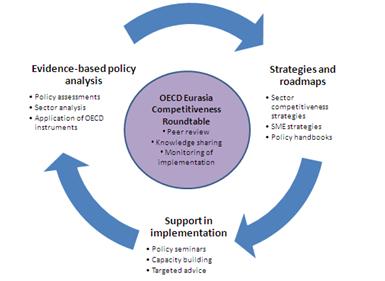About the OECD Eurasia Competitiveness Programme
| The OECD Eurasia Competitiveness Programme was launched in 2008 to support Eurasian economies in developing more vibrant and competitive markets. The programme uses OECD instruments and tools in order to assess where and how to enhance competitiveness of countries, sectors and regions to generate sustainable growth. It includes two regions: Central Asia (Afghanistan, Kazakhstan, the Kyrgyz Republic, Mongolia, Tajikistan, Turkmenistan, Uzbekistan) and Eastern Europe and South Caucasus (Armenia, Azerbaijan, Belarus, Georgia, the Republic of Moldova and Ukraine). |
A three-step approach
 |
This approach comprises both a regional dimension, which entails peer dialogue and capacity building, and a country-specific aspect supporting the implementation of a number of prioritised reforms. Sectoral analyses cover the formulation of targeted policies and strategies requested at the industry level. |
Within the framework of the programme, public authorities, the private sector and civil society in these countries have been engaged in a dialogue and collaborative process to support policy actions and identify the key barriers to sectoral competitiveness. The participation of all the stakeholders in the reform process, including foreign investors, is considered to be crucial for guaranteeing the effectiveness and transparency of the recommended policies.
Related Documents

